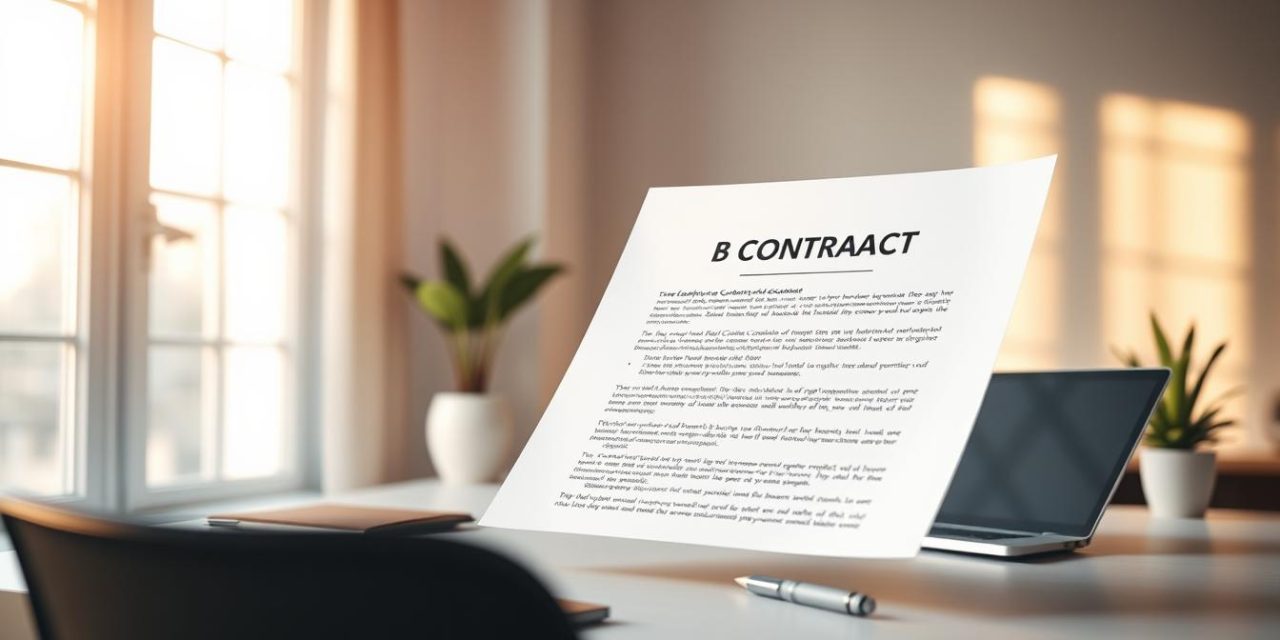Start smart: a clear contract is the quickest way to reduce risks. In France, a written freelance contract is not mandatory, but a short, well-drafted agreement prevents misunderstandings and keeps the relationship professional. This guide shows how a solid contract defines scope, deliverables, payment, and practical steps for delays or changes.
You will learn what matters most when you and a client agree to work together. We explain how to gather the right information from both parties and which details legal or procurement teams typically check. A clear agreement helps you get paid on time and protects your business rights and obligations.
We also cover France-specific points. The Qonto guide by Sarah Aberman notes that maintaining independence — no subordination link — is essential to avoid reclassification by a company. Clients may request a K or Kbis extract and an attestation de vigilance from URSSAF for service projects over €5,000 before signature and every six months.
Table of Contents
Key Takeaways
- Use a written contract to set scope, price, and timelines.
- Collect essential information and prepare K/Kbis and URSSAF documents when needed.
- State each party’s obligations so work and payment are clear.
- Include terms for changes, delays, and early exits to reduce disputes.
- Confirm independence to lower the risk of employee reclassification.
What Are Freelance Contracts and Why They Matter Today
Knowing when a verbal promise holds up — and when it doesn’t — matters for every project in France. A short written agreement clarifies scope, time, price, and who owns the results. That single document reduces confusion and speeds approvals.
Freelancer vs. employee: independence, flexibility, and reclassification risk
The key test is subordination. If a client directs daily tasks, sets fixed hours, or treats you like staff, French law can reclassify the relationship as employment.
Keep the wording clear: state you decide methods, schedule, and tools. Add an « obligation of means » clause to show you provide effort, not a guaranteed result.
« A written clause confirming independence helps both parties and lowers reclassification risk. »
Verbal vs. written agreements in France: what holds up and when
Verbal agreements can have legal value if you can prove essential terms by dated messages or invoices. Still, confirm scope, deadlines, and payment in an email or short document to create a clear record.
- Ask the client to request or accept a brief addendum if their template implies supervision.
- Clients may check your K/Kbis and, for services over €5,000 before tax, they must obtain an URSSAF attestation de vigilance at signing and every six months.
For an example short template and practical tips, see this short freelance contract guide.
Core Building Blocks: Scope, Deliverables, and Expectations
A clear description of what you’ll do and what you won’t is the fastest way to avoid disputes on a project.
Start with a tight scope that lists objectives and specific tasks. Add one short sentence that defines what is expressly out of scope. This simple guardrail helps when new requests arrive.
Translate goals into named deliverables (format, acceptance criteria) and attach realistic dates. Note start date, milestones, and a final handoff window so deadlines and hours are clear.
Define roles early: state what the client must provide (briefs, assets, access) and when. Also state what you will deliver and any review cycles or included revisions.
| Item | What to include | Why it matters |
|---|---|---|
| Scope | Objectives, tasks, out-of-scope line | Limits change requests and keeps work focused |
| Deliverables | Names, formats, acceptance criteria | Removes ambiguity at delivery |
| Timing | Start date, milestones, final date | Prevents schedule crushes and late fees |
| Roles | Client inputs, your responsibilities | Speeds handoffs and reduces delays |
Include a single clause for change requests (written request + revised quote) and tie payment terms to milestones. For a sample short guide on terms and templates, see this short guide.
Payment Terms That Actually Get You Paid
Make payment terms precise so both parties know when funds must change hands.
Choose a clear pricing model — fixed fee, daily rate, or hybrid — and state the total compensation and what it includes. Add a simple schedule: down payment to reserve the slot, a mid-project installment, and a final payment on acceptance.
French default rules matter. By law, payment is due 30 days after the work is carried out unless the parties agree otherwise. The legal ceilings are 45 days end-of-month or 60 days from the invoice date.
Rates, milestones, down payments, and late fees
Spell out invoice cadence, PO references, and preferred method to speed processing. Include late-fee language and recovery-costs clauses so a company knows the consequences of late payment.

| Item | How to write it | Why it helps | Example |
|---|---|---|---|
| Pricing model | Fixed or daily; list inclusions/exclusions | Prevents surprises about scope and extra work | Fixed €5,000; revisions beyond 3 billed at €X/day |
| Milestones | Percent or amounts tied to deliverables | Improves cash flow and reduces risk | 30% upfront, 40% mid, 30% on acceptance |
| Timing | State 30 days default; optional 45 EOM or 60 max | Keeps terms within French laws and protects you | Payment due within 30 days of invoice |
| Remedies | Late fees, recovery costs, termination for non-payment | Gives leverage and a path to stop unpaid work | Interest + recovery costs; termination after two notices |
If a dispute arises over a deliverable, tie payment to undisputed milestones so work can continue while issues are resolved. For larger projects or companies, expect longer internal cycles and ask for a larger down payment to offset the extra time.
« Clear payment rules reduce friction and keep projects on track. »
For a short sample and practical tips, see this free template and tips.
Intellectual Property Rights and Ownership You Must Nail
A precise IP clause saves time and secures value for both parties. Without clear language, a company does not automatically own the work produced in France. The agreement must state whether rights are assigned or a license is granted and tie that choice to payment.
Assignment means full transfer: the client owns the outputs after payment. License limits use by scope, territory, duration, media, and exclusivity. Spell these points out so each party knows who can do what and where.
- State whether source files, code repositories, or raw assets are included and price them separately if needed.
- Remember moral rights remain with the author in France; add an attribution and modification clause.
- Keep non-compete and non-solicitation terms narrow and proportionate to be enforceable.
Include a time-limited confidentiality clause and note E&O insurance if you carry it. Finally, require full payment before transferring ownership or activating a license to protect both parties.
« Clear IP language prevents disputes and keeps projects moving. »
To learn more about how to understand your rights in practice, see the linked short guide.
France’s Legal Framework: Staying Compliant Without Stress
Knowing the legal guardrails in France keeps your projects moving and your status secure.
Keep independence explicit. Avoid wording that implies fixed hours, managerial direction, or embedded role duties. That helps prevent reclassification as an employee and keeps your work under commercial law.
No subordination link: drafting to avoid employee reclassification
State control and methods are yours. Add a short clause that you decide how and when work is done, and that the client sets only objectives and acceptance criteria.
Client checks: K/Kbis and URSSAF attestation for €5,000+ engagements
Clients may request your K or Kbis and must obtain an URSSAF attestation de vigilance for services over €5,000 before signing and every six months.
Tip: Offer these documents up front and set a reasonable time window to deliver them so start dates do not stall.
Umbrella companies, auto-entrepreneur, and cross-border GDPR basics
If you work via an umbrella company, expect the client to sign with that firm while you carry out the work under the umbrella’s payroll rules.
Auto-entrepreneur or company registrations (EURL/SASU) must match invoice and agreement information exactly. Mismatches slow procurement checks.
GDPR: process personal data only for the agreed purpose, minimize collection, and secure records. This is essential for cross-border work and client trust.
- Make the engagement fall under commercial law and confirm no subordination link in a short clause.
- State who the contracting party is when subcontracting, and accept responsibility for delivery unless otherwise stated.
- Keep copies of K/Kbis and attestation documents in a central folder for quick responses to client information requests.
| Issue | What to include | Why it matters |
|---|---|---|
| Independence | Clause: no fixed hours, you control methods | Protects against employee reclassification |
| Client checks | K/Kbis; URSSAF attestation for €5,000+ | Speeds onboarding and complies with procurement rules |
| Entity details | Accurate registration and invoicing info (EURL/SASU) | Reduces payment and legal delays |
| Data protection | GDPR basics: purpose, minimization, security | Safe cross-border work and client confidence |
Check your rights and obligations to ensure your agreement and paperwork match French rules and client expectations.
Essential Clauses to Reduce Risk and Disputes
A compact set of clauses clarifies what each party must do and when to stop work.
Confidentiality: define which information is confidential, set a limited duration, and list steps to protect data. Note exclusions like public knowledge and required disclosures.
Non-compete and non-solicitation: keep limits narrow in time, geography, and activities so a French court will likely uphold them. Make these proportional to the legitimate commercial risk.
Liability and insurance: state whether you carry E&O coverage and set balanced indemnities. Limit liability to fees paid when possible to align risk and payment.
Early termination & force majeure: name triggers (persistent non-performance, non-payment), required notice periods, and final accounting for fees. Add a short force majeure sentence to pause or extend timelines if events beyond control occur.
Dispute resolution: prefer a meet-meditate-arbitrate path. An arbitration clause (clause compromissoire) keeps most disputes out of court and speeds resolution.
Practical point: cross-reference intellectual property and property rights so ownership or licensing is clear at handoff. Require any change to be in writing and signed by each party.

How to Draft, Review, and Customize Your Contract
Start by choosing the right template or legal help to match the scale and risk of the engagement. A small project can use a tailored online template; high-value or complex deals usually need a lawyer-drafted agreement.
Templates vs. lawyer-drafted agreements: review any client-provided document line by line. Ask for edits where wording implies control, overbroad intellectual property rights, or payment dates that exceed French legal limits. Use templates to set scope, deliverables, hours, and billing cadence, but adapt wording to how you actually work.
Adapting clauses by project type
Match the format to the engagement. Project-based documents end at delivery. Ongoing retainers set recurring fees. Hourly agreements require time tracking and clear hours. Licensing deals focus on usage, duration, and property rights.
Practical checklist: include acceptance steps, number of included revisions, IP transfer tied to final payment, and a clear termination process. Keep a dated document version history so the latest date and signatories are obvious.
- Negotiate client standard documents to remove supervisory language.
- Customize templates for social media, web builds, content, or coaching as needed.
- For cross-border work, add GDPR basics and watch local rules like IR35 or work-for-hire.
Tip: Share a one-page summary with price, timeline, scope, and sign-off steps to speed approvals.
Negotiating With Clients: Price, Scope, and Boundaries
Good negotiations start by hearing what the client truly needs. Ask a few focused questions about goals, constraints, and timing so your proposal anchors on value rather than a raw number.
Present two or three options: a project fee, a retainer, and an hourly plan. This helps clients compare terms and find the right compensation and payment rhythm for the work.
Make sure scope is crisp and measurable. Link each deliverable to milestones and payment so both parties know when progress is accepted and invoices are due.
If a client pushes on price, propose reducing deliverables, changing the schedule, or lowering support levels instead of cutting the same package for less.
- Set expectations for feedback cycles and a light schedule of checkpoints.
- Support your fee with concise proof—case notes or outcomes that match the client’s needs.
- If urgency is requested, offer a clear rush fee and state limits.
« Confirm key terms in writing after the call and close with a short email summarizing next steps and payment terms. »
Conclusion
Conclude by fixing three key items in every deal: scope, payment, and rights. A short, clear contract speeds approvals and reduces disputes. It helps a client see deliverables, deadlines, and the acceptance steps at a glance.
Lock ownership and intellectual property rights early and link transfer to final payment. Keep confidentiality and fair non-compete language narrow, and include a straightforward termination and dispute path to avoid escalation.
Make sure the document confirms independence (no subordination), stores K/Kbis and URSSAF checks when needed, and stays focused on what the work will and will not cover. Update the contract when scope changes.
Do this and you protect your business, make payment predictable, and finish projects on time.
FAQ
What is the difference between an independent contractor and an employee in France?
In France, the key difference is the absence of a subordination link. Independent contractors control how and when they work, keep autonomy over tools and schedules, and invoice for services. Employees follow company instructions, receive payroll, and are subject to employment rules. Draft agreements to show autonomy—no fixed daily supervision, flexible hours, and clear invoicing—to reduce reclassification risk.
Do verbal agreements hold up under French law?
Verbal promises can be valid, but written agreements are far stronger. A signed document clarifies scope, payment, IP ownership, and termination. For contracts over €5,000, clients often request documents like Kbis or URSSAF attestations; having everything in writing helps with due diligence and dispute defense.
How should I define the scope of work to avoid scope creep?
Be specific: list objectives, tasks, deliverables, formats, and what’s out of scope. Add acceptance criteria, revision limits, and an hourly rate for extra work. A clear scope and change-order process prevent misunderstandings and keep timelines realistic.
What are best practices for setting timelines and deliverables?
Break projects into milestones with due dates and review windows. Include buffer time for feedback, a clear acceptance process, and consequences for missed approvals. Use milestone payments tied to deliverables to align incentives and protect cash flow.
Which payment terms improve the chance I get paid on time?
Use a deposit (20–50%) up front, milestone invoicing, and net payment terms (e.g., 30 days). Include late fees or interest and state accepted payment methods. Clear invoice requirements—PO numbers, contact person, and delivery receipts—speed processing.
What are France-specific payment timings I should know?
French commercial law commonly uses 30 days, with extensions like 45 days end of month (EOM) or up to 60 days only if contractually agreed and justified. Public-sector rules may differ. State your preferred term and confirm any client policies before signing.
How do I handle intellectual property (IP) ownership for a project?
Specify whether you assign IP to the client or grant a license. An assignment transfers ownership, often with payment; a license can be limited by duration, territory, or field of use. Also address moral rights, especially for creative works—state whether you waive or retain attribution and modification rights.
When should I grant a license instead of assigning rights?
Grant a license when you want to retain long-term control or reuse rights—common for templates, code libraries, or portfolio pieces. Limit the license by scope, time, and territory. Use assignment for unique, client-paid-for works where the client needs full control.
Can a client require portfolio use or public credit?
Yes, but include this in the agreement. Define what can be shown, when, and whether you can anonymize sensitive details. Clients may restrict portfolio use for confidentiality or regulatory reasons; negotiate mutually acceptable terms up front.
What clauses reduce the risk of disputes and liability?
Include confidentiality, clear deliverable specs, limitation of liability, indemnities, and insurance requirements (E&O or professional liability). State caps on damages and carve-outs for gross negligence. These clauses balance risk and make outcomes predictable for both parties.
How should I structure termination and force majeure clauses?
Define notice periods, cure windows, payment for work completed, and refund mechanics for advances. For force majeure, list events that pause obligations, the notice process, and remedies if disruption continues. Clear triggers and timelines minimize surprise losses.
When is arbitration better than court litigation?
Arbitration can be faster, confidential, and enforceable internationally. Specify seat, governing law, and arbitration rules (e.g., ICC). For smaller disputes, mediation first is often cheaper. Choose the option that fits the project value and client location.
Should I use a template or hire a lawyer to draft an agreement?
Use a well-reviewed template for low-risk, repeatable projects to save cost and time. Hire a lawyer for high-value deals, complex IP arrangements, cross-border work, or when local law nuances (like French labor rules) create reclassification risk. A lawyer tailors clauses to your exposure.
How do I adapt contract clauses for different project types?
For project-based work, focus on deliverables, milestones, and acceptance. For ongoing retainers, define scope caps, notice periods, and review cycles. Hourly work needs timesheets and billing intervals. Licensing deals require clear usage rights and royalties or fees.
What client checks are advisable for large contracts in France?
For contracts above €5,000, request the client’s Kbis extract and URSSAF attestation de vigilance. Verify VAT details and the legal entity. These checks help confirm solvency and compliance and reduce the chance of fraud or unpaid invoices.
How should confidentiality and NDAs be written to protect sensitive info?
Narrowly define confidential information, state exclusions (public knowledge, independently developed info), set a defined duration, and clarify return or destruction obligations. Include permitted disclosures (e.g., legal requirements) and remedies for breach.
What limits make non-compete and non-solicitation clauses enforceable?
Keep them proportional in time, geography, and scope. Show legitimate business interest—client relationships or trade secrets—and offer compensation if required by local law. Overbroad restrictions risk being voided by courts.
How does GDPR affect cross-border work and data handling?
Identify data controllers/processors, include data processing terms, and require appropriate technical and organizational measures. For transfers outside the EEA, use standard contractual clauses or other lawful mechanisms. Record data flows and maintain a data breach response plan.
What insurance should I have for professional services?
Professional liability (E&O) covers mistakes or omissions; general liability covers third-party injury/damage; cyber insurance helps with data breaches. Tailor coverage limits to project size and contractual indemnities.
How can I negotiate better payment and scope terms with clients?
Lead with value: explain deliverables and results tied to milestones. Offer tiered pricing or pilot phases to reduce client risk. Push for deposits, milestone payments, and clear out-of-scope rates. Stay friendly but firm—document negotiated changes in writing.
What steps protect my portfolio and reuse rights while meeting client needs?
Carve out a portfolio license allowing non-sensitive work to appear in case studies after a set period. Redact confidential details, secure client approval for public materials, and consider licensing back limited rights for templates or code you reuse.
If a client refuses to pay, what are practical next steps?
Re-send the invoice with a polite reminder and copy the contract terms. Offer a payment plan if appropriate. If unpaid, escalate to formal demand letters, mediation, or small claims/arbitration depending on the amount. Keep records of communications and deliverables to support your claim.





